Unit 2 Neighbours Grammar 课件(共28张PPT) 2023-2024学年牛津译林版英语七年级下册
文档属性
| 名称 | Unit 2 Neighbours Grammar 课件(共28张PPT) 2023-2024学年牛津译林版英语七年级下册 |  | |
| 格式 | pptx | ||
| 文件大小 | 6.1MB | ||
| 资源类型 | 教案 | ||
| 版本资源 | 牛津译林版 | ||
| 科目 | 英语 | ||
| 更新时间 | 2024-01-03 10:28:57 | ||
图片预览



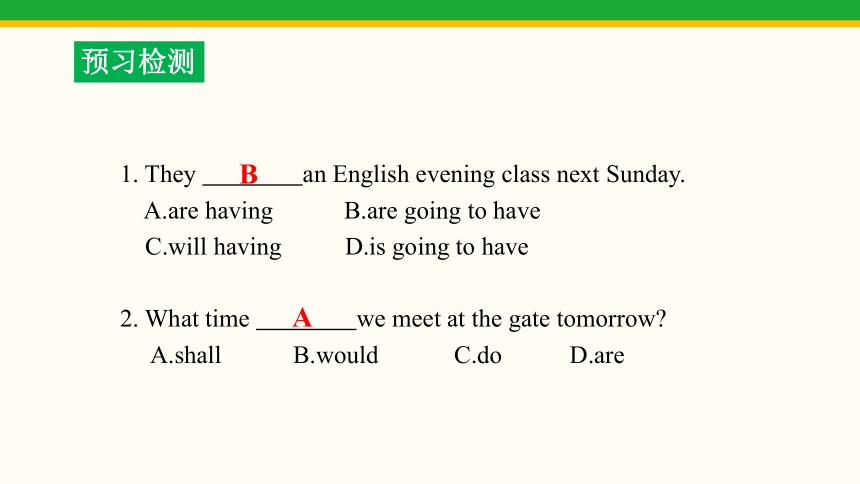
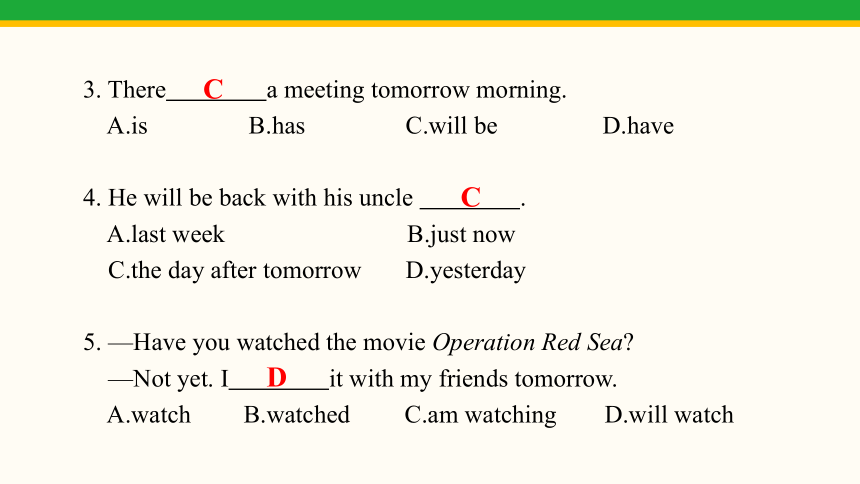
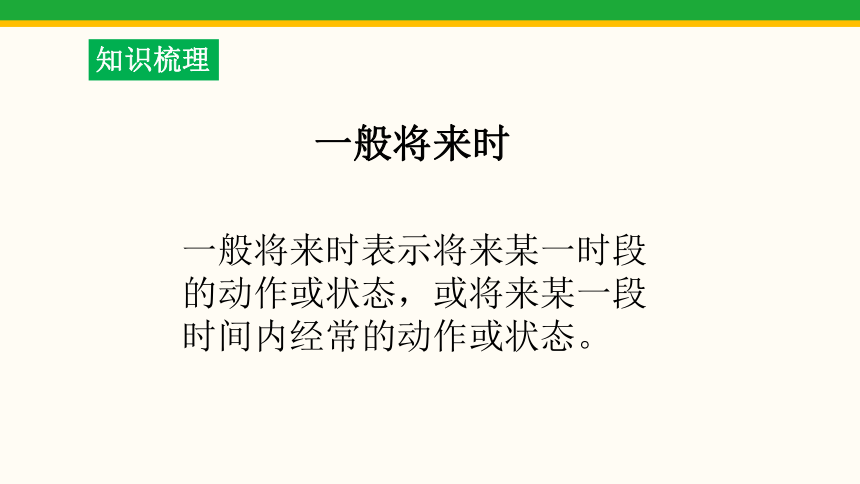
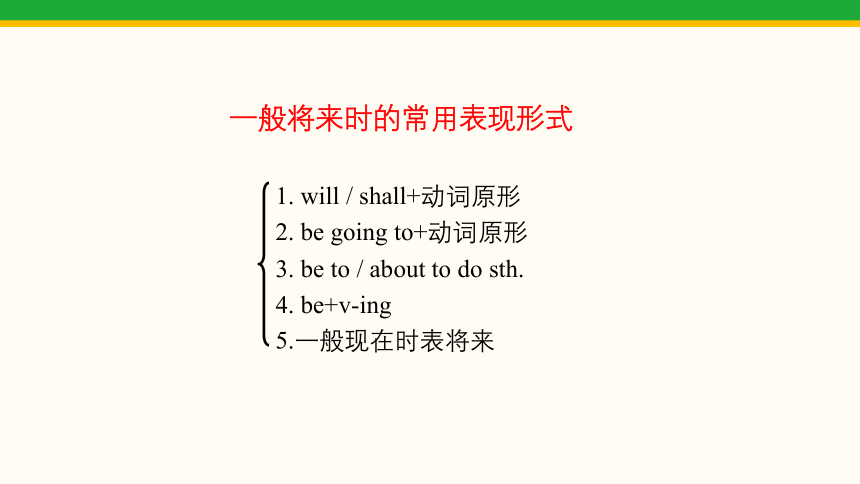
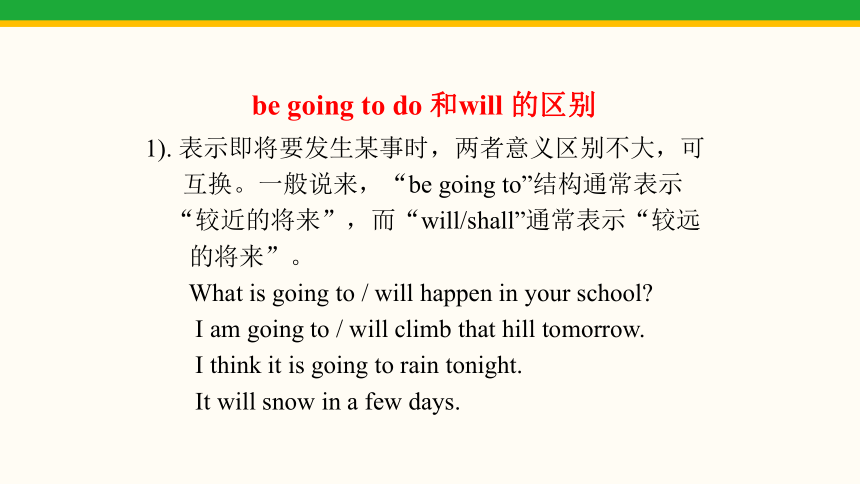
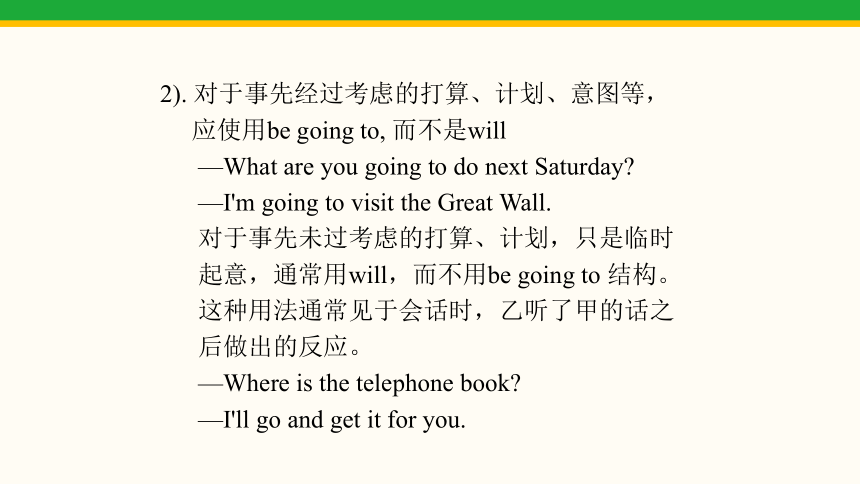
文档简介
(共28张PPT)
译林版
初中英语 译林版七年级下册
Unit 2
Period 3
Grammar
新课导入
1
2
能熟悉并正确运用本课时的重点单词和短语。
能正确运用will和be going to表将来。
预习检测
B
1. They an English evening class next Sunday.
A.are having B.are going to have
C.will having D.is going to have
2. What time we meet at the gate tomorrow
A.shall B.would C.do D.are
A
3. There a meeting tomorrow morning.
A.is B.has C.will be D.have
4. He will be back with his uncle .
A.last week B.just now
C.the day after tomorrow D.yesterday
5. —Have you watched the movie Operation Red Sea
—Not yet. I it with my friends tomorrow.
A.watch B.watched C.am watching D.will watch
C
C
D
知识梳理
一般将来时
一般将来时表示将来某一时段的动作或状态,或将来某一段时间内经常的动作或状态。
一般将来时的常用表现形式
1. will / shall+动词原形
2. be going to+动词原形
3. be to / about to do sth.
4. be+v-ing
5.一般现在时表将来
be going to do 和will 的区别
1). 表示即将要发生某事时,两者意义区别不大,可
互换。一般说来,“be going to”结构通常表示
“较近的将来”,而“will/shall”通常表示“较远
的将来”。
What is going to / will happen in your school
I am going to / will climb that hill tomorrow.
I think it is going to rain tonight.
It will snow in a few days.
2). 对于事先经过考虑的打算、计划、意图等,
应使用be going to, 而不是will
—What are you going to do next Saturday
—I'm going to visit the Great Wall.
对于事先未过考虑的打算、计划,只是临时
起意,通常用will,而不用be going to 结构。
这种用法通常见于会话时,乙听了甲的话之
后做出的反应。
—Where is the telephone book
—I'll go and get it for you.
3). be going to 表示根据主观判断将来肯定发生的
事情,will 表示客观上将来势必发生的事(will
可表示不以人的意志为转移的自然发展的未
来的事)。
He is seriously ill. He is going to die.
He will be 20 years old next year.
Tomorrow will be Saturday.
It will be my birthday tomorrow.
4). 在有条件从句的主句中,一般不用be going to,
而多用will.
If it rains tomorrow, I'll stay with you.
在宾语从句中,主句将来时多用will/shall,
而不用be going to
I'm sure she will come tomorrow.
will和shall表示将来时的用法
A Simple future tense with will and shall
We use will or shall when we talk about
1 things that are sure to happen in the future:
It will rain this afternoon.
2 plans that we are making now:
I will take an umbrella with me.
We make positive and negative forms like this:
I/We go.
You/They/He/She/It
Yes, I/we
you/they he/she/it
No, I/we
you/they/he/she/it
will/shall.
will.
will not/
shall not.
will not.
will (not)/shall (not)
will (not)
We ask and answer questions like this:
I/we go
you/they/he/she/it
Will/Shall
Will
Note:
We usually use will. We only use shall with I or
we, and this usage is becoming old-fashioned.
shall只用于第一人称搭配
I will/shall=I'll
I will not=I won't
I shall not=I shan't
1. Will和shall用于将来时,后接动词原形,
用来表示将要发生的事或者计划做的事。
2. will可与一二三人称搭配使用,shall只与
第一人称搭配使用。
3. will不受人称的影响,在一二三人称后均
使用原型will。
4. will和shall的否定形式即在其后面加not。
Will / Shall
Simon's computer is broken. He is asking someone at the community center for plete their conversation with the simple future tense of the verbs in brackets.
Mr Lin: Hello, Simon. Do you need any help
Simon: Yes, Mr Lin. There's something wrong with my computer.
Mr Lin: OK. We ___________ (ask) an engineer to check it for you.
Simon: When _____ the engineer ___(be) free
Mr Lin: Well, we ___________(call) him first. _____ you _____(wait)
for us to call back
Simon: All right. I ___________ (wait) for your call. Thanks.
Mr Lin: You're welcome.
will/shall ask
will/shall call
will
Will
wait
will/shall wait
be
Work in pairs and act it out!
通过以
活动小结
当堂检测见DCF课件
通过以上活动,我们学习了will和shall的用法,will和shall用于___________时态,后接______________,表示在将来发生的事或者计划做的事。否定句直接在其后加_____________,一般疑问句直接将其____________。
not
将来
动词原形
提前
探究二
be going to的用法
B Simple future tense with be going to
We use be going to when we talk about
1 somethings we decide to do:
I am going to visit our new neighbours.
She is going to watch the film next Friday.
2 things that will probably happen:
It is nine o'clock. We are going to be late.
It is so cloudy. I think it is going to rain.
We ask and answer questions like this:
I going to have a party
tomorrow
you/we/they
she/he/it
Yes, I
you/we/they
he/she/it
No, I
you/we/they
he/she/it
Am
Are
Is
am
are
is
am not
are not
is not
When we use be going to without a time expression, we are talking about the near future.
We often use some time expressions when we talk about the future.
this afternoon tonight tomorrow
the day after tomorrow this Sunday
next Tuesday next week
are not = aren't is not = isn't
Note:
1. be going to 用于将来时,后接动词原形,用
来表示决定要做的事或可能将要发生的事。
2. be going to可与一二三人称搭配使用。
3. be going to受人称的影响,be与不同人称搭
配时有不同的形式。第一人称单数am going
to,第一人称复数、第二人称单复数和第
三人称复数are going to,第三人称单数is
going to
4. be going to的否定形式在be后面加not,
即be not going to。
be going to
Simon is telling Amy about his plan for a day out with his uncle's family. Help him use the correct forms of be going to to talk about his plan.
Simon: Hi, Amy. My parents and I are planning a day out
with my uncle's family the day after tomorrow.
Amy: Great! What ___ you ___________ (do)
Simon: I ______________ (buy) some food, and my cousin
Annie ____________ (buy) some plates and forks.
Amy: What ___ your parents __________ (do)
Simon: They ________________ (bring) some water.
Amy: How about your uncle
Simon: He _______________ (make) a fire.
Amy: And your aunt What ___ she ___________ (do)
Simon: She ______________ (cook) some food.
are going to do
am going to buy
is going to buy
is going to make
are going to bring
is going to do
is going to cook
are going to do
Work in pairs and act it out!
活动小结
通过以上活动,我们可以知道,be going to 用于_________时态,后接____________,表示决定要做的事或可能将要发生的事。
将来
动词原形
当堂检测
句型转换。
1. She will go to the school this Sunday.
否定句:
一般疑问句:
肯定回答/否定回答
She will not go to the school this Sunday.
Will she go to the school this Sunday.
Yes, she will. / No, she will not.
2. She is going to watch the film this evening.
否定句:
一般疑问句:
肯定回答/否定回答
She is not going to watch the film this evening.
Is she going to watch the film this evening.
Yes, she is. / No, she is not.
Will和shall的用法:
will和shall用于________时态,后接_________,表示在将来发生的事或者计划做的事。
be going to的用法:
be going to 用于________时态,后接_________,表示决定要做的事或可能将要发生的事。
Unit 2
Period 3
将来
动词原形
将来
动词原形
译林版
初中英语 译林版七年级下册
Unit 2
Period 3
Grammar
新课导入
1
2
能熟悉并正确运用本课时的重点单词和短语。
能正确运用will和be going to表将来。
预习检测
B
1. They an English evening class next Sunday.
A.are having B.are going to have
C.will having D.is going to have
2. What time we meet at the gate tomorrow
A.shall B.would C.do D.are
A
3. There a meeting tomorrow morning.
A.is B.has C.will be D.have
4. He will be back with his uncle .
A.last week B.just now
C.the day after tomorrow D.yesterday
5. —Have you watched the movie Operation Red Sea
—Not yet. I it with my friends tomorrow.
A.watch B.watched C.am watching D.will watch
C
C
D
知识梳理
一般将来时
一般将来时表示将来某一时段的动作或状态,或将来某一段时间内经常的动作或状态。
一般将来时的常用表现形式
1. will / shall+动词原形
2. be going to+动词原形
3. be to / about to do sth.
4. be+v-ing
5.一般现在时表将来
be going to do 和will 的区别
1). 表示即将要发生某事时,两者意义区别不大,可
互换。一般说来,“be going to”结构通常表示
“较近的将来”,而“will/shall”通常表示“较远
的将来”。
What is going to / will happen in your school
I am going to / will climb that hill tomorrow.
I think it is going to rain tonight.
It will snow in a few days.
2). 对于事先经过考虑的打算、计划、意图等,
应使用be going to, 而不是will
—What are you going to do next Saturday
—I'm going to visit the Great Wall.
对于事先未过考虑的打算、计划,只是临时
起意,通常用will,而不用be going to 结构。
这种用法通常见于会话时,乙听了甲的话之
后做出的反应。
—Where is the telephone book
—I'll go and get it for you.
3). be going to 表示根据主观判断将来肯定发生的
事情,will 表示客观上将来势必发生的事(will
可表示不以人的意志为转移的自然发展的未
来的事)。
He is seriously ill. He is going to die.
He will be 20 years old next year.
Tomorrow will be Saturday.
It will be my birthday tomorrow.
4). 在有条件从句的主句中,一般不用be going to,
而多用will.
If it rains tomorrow, I'll stay with you.
在宾语从句中,主句将来时多用will/shall,
而不用be going to
I'm sure she will come tomorrow.
will和shall表示将来时的用法
A Simple future tense with will and shall
We use will or shall when we talk about
1 things that are sure to happen in the future:
It will rain this afternoon.
2 plans that we are making now:
I will take an umbrella with me.
We make positive and negative forms like this:
I/We go.
You/They/He/She/It
Yes, I/we
you/they he/she/it
No, I/we
you/they/he/she/it
will/shall.
will.
will not/
shall not.
will not.
will (not)/shall (not)
will (not)
We ask and answer questions like this:
I/we go
you/they/he/she/it
Will/Shall
Will
Note:
We usually use will. We only use shall with I or
we, and this usage is becoming old-fashioned.
shall只用于第一人称搭配
I will/shall=I'll
I will not=I won't
I shall not=I shan't
1. Will和shall用于将来时,后接动词原形,
用来表示将要发生的事或者计划做的事。
2. will可与一二三人称搭配使用,shall只与
第一人称搭配使用。
3. will不受人称的影响,在一二三人称后均
使用原型will。
4. will和shall的否定形式即在其后面加not。
Will / Shall
Simon's computer is broken. He is asking someone at the community center for plete their conversation with the simple future tense of the verbs in brackets.
Mr Lin: Hello, Simon. Do you need any help
Simon: Yes, Mr Lin. There's something wrong with my computer.
Mr Lin: OK. We ___________ (ask) an engineer to check it for you.
Simon: When _____ the engineer ___(be) free
Mr Lin: Well, we ___________(call) him first. _____ you _____(wait)
for us to call back
Simon: All right. I ___________ (wait) for your call. Thanks.
Mr Lin: You're welcome.
will/shall ask
will/shall call
will
Will
wait
will/shall wait
be
Work in pairs and act it out!
通过以
活动小结
当堂检测见DCF课件
通过以上活动,我们学习了will和shall的用法,will和shall用于___________时态,后接______________,表示在将来发生的事或者计划做的事。否定句直接在其后加_____________,一般疑问句直接将其____________。
not
将来
动词原形
提前
探究二
be going to的用法
B Simple future tense with be going to
We use be going to when we talk about
1 somethings we decide to do:
I am going to visit our new neighbours.
She is going to watch the film next Friday.
2 things that will probably happen:
It is nine o'clock. We are going to be late.
It is so cloudy. I think it is going to rain.
We ask and answer questions like this:
I going to have a party
tomorrow
you/we/they
she/he/it
Yes, I
you/we/they
he/she/it
No, I
you/we/they
he/she/it
Am
Are
Is
am
are
is
am not
are not
is not
When we use be going to without a time expression, we are talking about the near future.
We often use some time expressions when we talk about the future.
this afternoon tonight tomorrow
the day after tomorrow this Sunday
next Tuesday next week
are not = aren't is not = isn't
Note:
1. be going to 用于将来时,后接动词原形,用
来表示决定要做的事或可能将要发生的事。
2. be going to可与一二三人称搭配使用。
3. be going to受人称的影响,be与不同人称搭
配时有不同的形式。第一人称单数am going
to,第一人称复数、第二人称单复数和第
三人称复数are going to,第三人称单数is
going to
4. be going to的否定形式在be后面加not,
即be not going to。
be going to
Simon is telling Amy about his plan for a day out with his uncle's family. Help him use the correct forms of be going to to talk about his plan.
Simon: Hi, Amy. My parents and I are planning a day out
with my uncle's family the day after tomorrow.
Amy: Great! What ___ you ___________ (do)
Simon: I ______________ (buy) some food, and my cousin
Annie ____________ (buy) some plates and forks.
Amy: What ___ your parents __________ (do)
Simon: They ________________ (bring) some water.
Amy: How about your uncle
Simon: He _______________ (make) a fire.
Amy: And your aunt What ___ she ___________ (do)
Simon: She ______________ (cook) some food.
are going to do
am going to buy
is going to buy
is going to make
are going to bring
is going to do
is going to cook
are going to do
Work in pairs and act it out!
活动小结
通过以上活动,我们可以知道,be going to 用于_________时态,后接____________,表示决定要做的事或可能将要发生的事。
将来
动词原形
当堂检测
句型转换。
1. She will go to the school this Sunday.
否定句:
一般疑问句:
肯定回答/否定回答
She will not go to the school this Sunday.
Will she go to the school this Sunday.
Yes, she will. / No, she will not.
2. She is going to watch the film this evening.
否定句:
一般疑问句:
肯定回答/否定回答
She is not going to watch the film this evening.
Is she going to watch the film this evening.
Yes, she is. / No, she is not.
Will和shall的用法:
will和shall用于________时态,后接_________,表示在将来发生的事或者计划做的事。
be going to的用法:
be going to 用于________时态,后接_________,表示决定要做的事或可能将要发生的事。
Unit 2
Period 3
将来
动词原形
将来
动词原形
